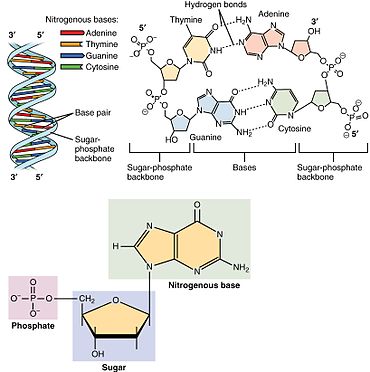
noun Biochemistry.
- any of a group of molecules that, when linked together, form the building blocks of DNA or RNA: composed of a phosphate group, the bases adenine, cytosine, guanine, and thymine, and a pentose sugar, in RNA the thymine base being replaced by uracil.
noun
- biochem a compound consisting of a nucleoside linked to phosphoric acid. Nucleic acids are made up of long chains (polynucleotides) of such compounds
n.1908, from German nucleotid (1908), from nucleo-, modern comb. form of Latin nucleus (see nucleus) + -ide, with -t- for the sake of euphony. n.
- Any of various compounds consisting of a nucleoside combined with a phosphate group and forming the basic constituent of DNA and RNA.
- Any of a group of organic compounds composed of a nucleoside linked to a phosphate group. Nucleotides are the basic building blocks of nucleic acids.
The molecules that form the basic modular structure of the double helix of the DNA molecule. A nucleotide consists of three molecules — a sugar, a phosphate group, and a molecule called a base. If the double helix is a twisted ladder, the sugar and phosphates form the sides of the ladder and pairs of bases form the rungs. There are four different bases, usually abbreviated A, C, G, and T for adenine, cytosine, guanine, and thymine). The order of bases in DNA determines the genetic code.
 Liberal Dictionary English Dictionary
Liberal Dictionary English Dictionary